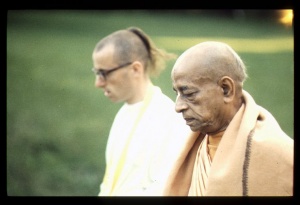BG 8.27: Difference between revisions
m (1 revision(s)) |
(Vanibot #0054 edit - transform synonyms into clickable links, which search similar occurrences (split by space character)) |
||
| (2 intermediate revisions by 2 users not shown) | |||
| Line 1: | Line 1: | ||
{{ | [[Category:Bhagavad-gita As It Is (1983+) - Chapter 08]] | ||
<div style="float:left">'''[[Bhagavad-gita As It Is (1983+)]] - [[BG 8 (1983+)|Chapter 8: Attaining the Supreme]]'''</div> | |||
<div style="float:right">[[File:Go-previous.png|link=BG 8.26]] '''[[BG 8.26]] - [[BG 8.28]]''' [[File:Go-next.png|link=BG 8.28]]</div> | |||
{{CompareVersions|BG|8.27|BG 1972|BG 1983+}} | |||
{{RandomImage}} | |||
==== TEXT 27 ==== | ==== TEXT 27 ==== | ||
<div class="devanagari"> | |||
:नैते सृती पार्थ जानन्योगी मुह्यति कश्चन । | |||
:तस्मात्सर्वेषु कालेषु योगयुक्तो भवार्जुन ॥२७॥ | |||
</div> | |||
<div | <div class="verse"> | ||
:naite sṛtī pārtha jānan | |||
:yogī muhyati kaścana | |||
:tasmāt sarveṣu kāleṣu | |||
:yoga-yukto bhavārjuna | |||
</div> | </div> | ||
==== SYNONYMS ==== | ==== SYNONYMS ==== | ||
<div class="synonyms"> | |||
<div | ''[//vanipedia.org/wiki/Special:VaniSearch?s=na&tab=syno_o&ds=1 na]'' — never; ''[//vanipedia.org/wiki/Special:VaniSearch?s=ete&tab=syno_o&ds=1 ete]'' — these two; ''[//vanipedia.org/wiki/Special:VaniSearch?s=sṛtī&tab=syno_o&ds=1 sṛtī]'' — different paths; ''[//vanipedia.org/wiki/Special:VaniSearch?s=pārtha&tab=syno_o&ds=1 pārtha]'' — O son of Pṛthā; ''[//vanipedia.org/wiki/Special:VaniSearch?s=jānan&tab=syno_o&ds=1 jānan]'' — even if he knows; ''[//vanipedia.org/wiki/Special:VaniSearch?s=yogī&tab=syno_o&ds=1 yogī]'' — the devotee of the Lord; ''[//vanipedia.org/wiki/Special:VaniSearch?s=muhyati&tab=syno_o&ds=1 muhyati]'' — is bewildered; ''[//vanipedia.org/wiki/Special:VaniSearch?s=kaścana&tab=syno_o&ds=1 kaścana]'' — any; ''[//vanipedia.org/wiki/Special:VaniSearch?s=tasmāt&tab=syno_o&ds=1 tasmāt]'' — therefore; ''[//vanipedia.org/wiki/Special:VaniSearch?s=sarveṣu&tab=syno_o&ds=1 sarveṣu] [//vanipedia.org/wiki/Special:VaniSearch?s=kāleṣu&tab=syno_o&ds=1 kāleṣu]'' — always; ''[//vanipedia.org/wiki/Special:VaniSearch?s=yoga&tab=syno_o&ds=1 yoga]-[//vanipedia.org/wiki/Special:VaniSearch?s=yuktaḥ&tab=syno_o&ds=1 yuktaḥ]'' — engaged in Kṛṣṇa consciousness; ''[//vanipedia.org/wiki/Special:VaniSearch?s=bhava&tab=syno_o&ds=1 bhava]'' — just become; ''[//vanipedia.org/wiki/Special:VaniSearch?s=arjuna&tab=syno_o&ds=1 arjuna]'' — O Arjuna. | ||
</div> | </div> | ||
==== TRANSLATION ==== | ==== TRANSLATION ==== | ||
<div class="translation"> | |||
<div | |||
Although the devotees know these two paths, O Arjuna, they are never bewildered. Therefore be always fixed in devotion. | Although the devotees know these two paths, O Arjuna, they are never bewildered. Therefore be always fixed in devotion. | ||
</div> | </div> | ||
==== PURPORT ==== | |||
= | <div class="purport"> | ||
Kṛṣṇa is here advising Arjuna that he should not be disturbed by the different paths the soul can take when leaving the material world. A devotee of the Supreme Lord should not worry whether he will depart by arrangement or by accident. The devotee should be firmly established in Kṛṣṇa consciousness and chant Hare Kṛṣṇa. He should know that concern over either of these two paths is troublesome. The best way to be absorbed in Kṛṣṇa consciousness is to be always dovetailed in His service, and this will make one's path to the spiritual kingdom safe, certain and direct. The word ''yoga-yukta'' is especially significant in this verse. One who is firm in ''yoga'' is constantly engaged in Kṛṣṇa consciousness in all his activities. Śrī Rūpa Gosvāmī advises, ''anāsaktasya viṣayān yathārham upayuñjataḥ:'' one should be unattached in material affairs and do everything in Kṛṣṇa consciousness. By this system, which is called yukta-vairāgya, one attains perfection. Therefore the devotee is not disturbed by these descriptions, because he knows that his passage to the supreme abode is guaranteed by devotional service. | |||
</div> | |||
<div | <div style="float:right; clear:both;">[[File:Go-previous.png|link=BG 8.26]] '''[[BG 8.26]] - [[BG 8.28]]''' [[File:Go-next.png|link=BG 8.28]]</div> | ||
__NOTOC__ | |||
</div> | __NOEDITSECTION__ | ||
__NOTOC__ | |||
Latest revision as of 16:19, 17 February 2024

A.C. Bhaktivedanta Swami Prabhupada
TEXT 27
- नैते सृती पार्थ जानन्योगी मुह्यति कश्चन ।
- तस्मात्सर्वेषु कालेषु योगयुक्तो भवार्जुन ॥२७॥
- naite sṛtī pārtha jānan
- yogī muhyati kaścana
- tasmāt sarveṣu kāleṣu
- yoga-yukto bhavārjuna
SYNONYMS
na — never; ete — these two; sṛtī — different paths; pārtha — O son of Pṛthā; jānan — even if he knows; yogī — the devotee of the Lord; muhyati — is bewildered; kaścana — any; tasmāt — therefore; sarveṣu kāleṣu — always; yoga-yuktaḥ — engaged in Kṛṣṇa consciousness; bhava — just become; arjuna — O Arjuna.
TRANSLATION
Although the devotees know these two paths, O Arjuna, they are never bewildered. Therefore be always fixed in devotion.
PURPORT
Kṛṣṇa is here advising Arjuna that he should not be disturbed by the different paths the soul can take when leaving the material world. A devotee of the Supreme Lord should not worry whether he will depart by arrangement or by accident. The devotee should be firmly established in Kṛṣṇa consciousness and chant Hare Kṛṣṇa. He should know that concern over either of these two paths is troublesome. The best way to be absorbed in Kṛṣṇa consciousness is to be always dovetailed in His service, and this will make one's path to the spiritual kingdom safe, certain and direct. The word yoga-yukta is especially significant in this verse. One who is firm in yoga is constantly engaged in Kṛṣṇa consciousness in all his activities. Śrī Rūpa Gosvāmī advises, anāsaktasya viṣayān yathārham upayuñjataḥ: one should be unattached in material affairs and do everything in Kṛṣṇa consciousness. By this system, which is called yukta-vairāgya, one attains perfection. Therefore the devotee is not disturbed by these descriptions, because he knows that his passage to the supreme abode is guaranteed by devotional service.